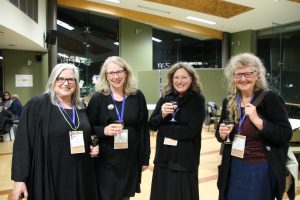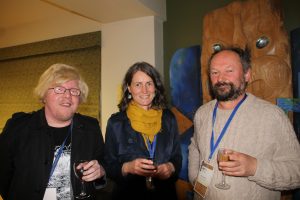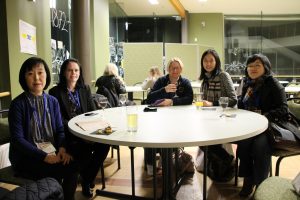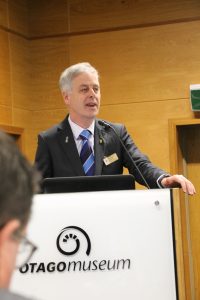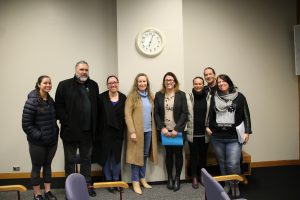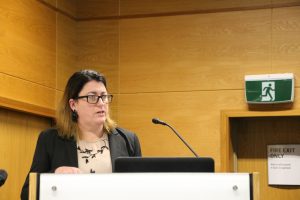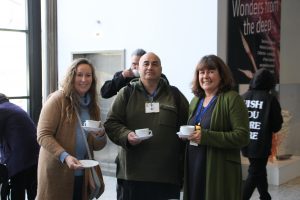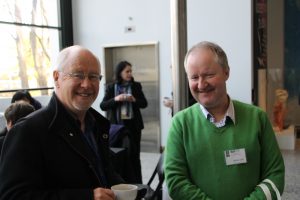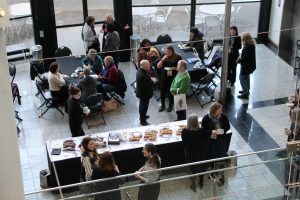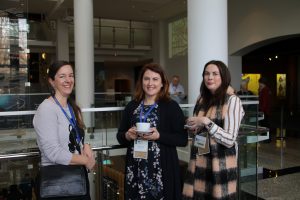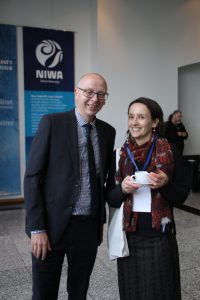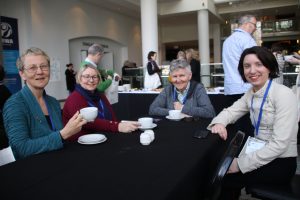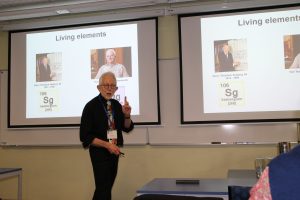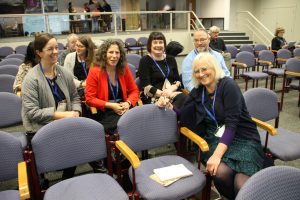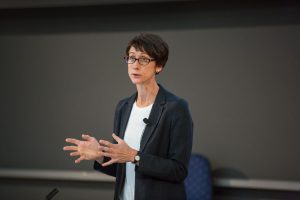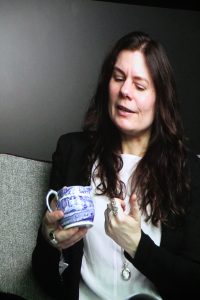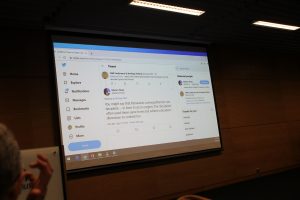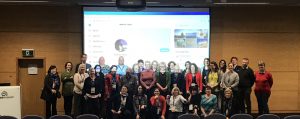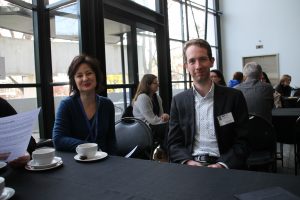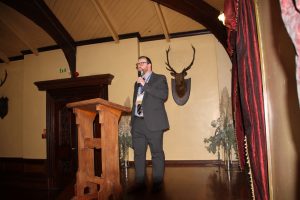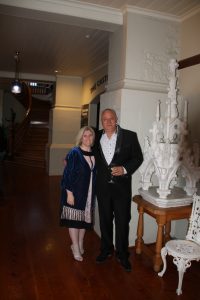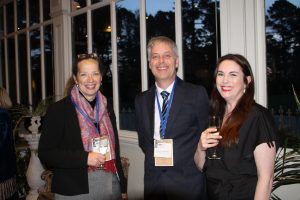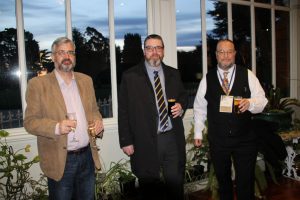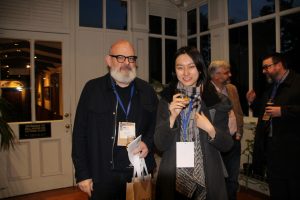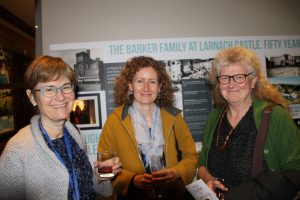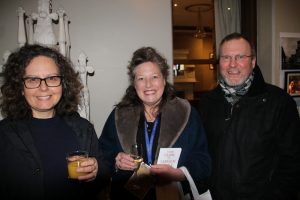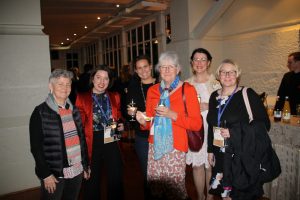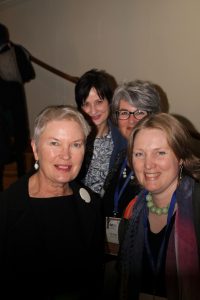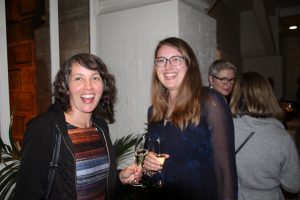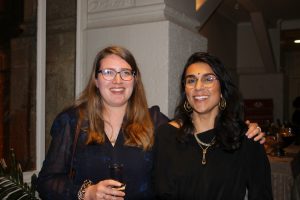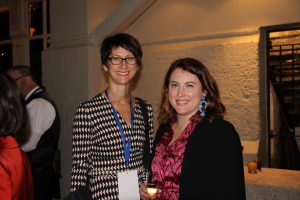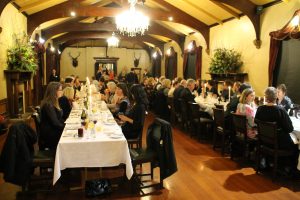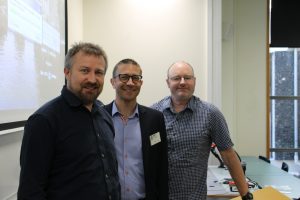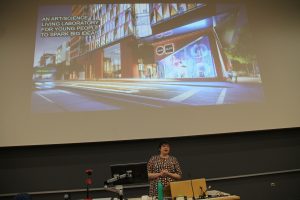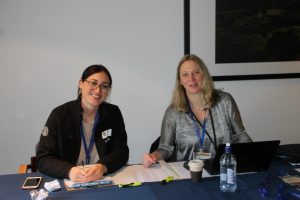The amazing “1869” conference
Otago hosted a brilliant hybrid conference this week, the “1869 Conference and Heritage Festival”. By “hybrid” I mean that it was the annual conference for the Australasian Victorian Studies Association, while also celebrating the University of Otago’s 150th anniversary, and sitting alongside the Dunedin Heritage Festival. While the Centre for Colonial Culture was a key sponsor, with Associate Professor Angela Wanhalla as one of the co-convevors (together with Kirby Hallum), a cross section of the university’s faculty was represented on the organising committee. The melange meant that most people engaged with papers that they would normally never encounter at their more usual disciplinary conferences, although this added to, rather than diminished, the event’s success. [See below for photos]
On Wednesday evening, the conference began with an all-women panel, looking at “Heritage through Words, Pictures and Threads”. Chaired by Kirby, the panel featured the novelist and academic, Tina Makereti, who discussed her latest novel, The Imaginary Lives of James Poneke; Lisa Chatfield, the producer for the BBC television adaptation of The Luminaries; Madeleine Seys, author of Fashion and Narrative in Victorian Popular Literature; and Otago’s Catherine Smith, an expert behind the science of traditional Māori weaving. This was a wonderful collaboration, exciting for those interested in the sumptuous garments of the Victorian era, but also drawing a number of different “threads” together. This was followed by a reception held in Te Tumu: School of Māori, Pacific and Indigenous Studies.
1869 was formally opened in the Otago Museum on Thursday (26 September) with a mihi whakatau from Tuari Pōtiki representing both Kāi Tahu and the university, a short welcome from the DVC Research, Professor Richard Blaikie, and an amusing and uplifting speech from the Hon Grant Robertson, an Otago alumnus as well as the current (among other portfolios) Minister for Arts, Culture and Heritage. The PVC Humanities, Professor Tony Ballantyne then introduced the first keynote speaker, Megan Pōtiki of Te Tumu, who discussed how the school established in 1869 contributed to the demise of the speaking of te reo Māori at Ōtākou, just under 30 minutes drive from the city. However, in more recent years the concerted efforts of local people have seen the revival in the language at the kāik.
There are too many individual presentations to mention them all. Most were what one might expect at a history or literature conferences, but also sprinkled with a few science-orientated talks as well. Several stand out, such as the presentation by Dr Ian Chapman on the links between Jules Verne’s From the Earth to the Moon with David Bowie’s Space Oddity – including a live band!; Lyndon Fraser’s swirling PowerPoint while discussing women’s wills in Victorian Canterbury; and Lyall Hanton’s physically animated talk on Joseph Mellor’s 16 million words on the Periodic Table. But the organisers were gratified at the high quality of all the panel presentations.
The conference highlights, of course, were the keynotes. On Thursday evening, people braved a dismal night to listen to Helen Pearson, editor of Nature, a journal that shares a 150th birthday with the university. Helen gave a wonderful talk on the past, present and future of this illustrious journal, noted not just for its academic papers but the science reporting and commentary. The “past” incorporated some of the journal’s many key publications, such as Francis Crick and James Watson’s groundbreaking paper on DNA in 1929, as well as a notable failure, an account on cold fusion. Helen also discussed Nature’s current situation, and how that may change with the growing demand for open-access publications.
Marian Thain, of Kings College London, was unable to make it to Dunedin for the conference, but nevertheless presented on“Cosmopolitanism, Nationalism and the Politics of Parnassian Poetry (1860s-1880s)” on Friday. An exploration of how English poets adapted the ballade, a French poetry genre, the talk discussed how the Parnassian poets’ efforts spawned tensions between those who favoured a more international outlook and those who advocated for more British forms of verse. Marion pre-recorded her video presentation, and invited questions via Twitter both during and after its viewing, which worked really successfully. Indeed, the conference goers included a number of enthusiastic tweeps, with the conference at one point trending up to 5th place in New Zealand’s Twitter rankings. See #otago1869 and #avsa2019.
Conference goers were treated on Friday evening to a bus trip up to the historic Larnarch’s Castle atop the Otago Peninsula. On arrival, just before dusk, the swirl of bagpipes greeted us as we alighted the buses and entered the castle. After newcomers had undertaken a tour of the building and we had all had the opportunity to wet the whistle, we all entered into the banquet hall for a marvellous feast. The “entertainment” for the evening was Professor Liam McIlvanney, who gave a wonderful speech arguing that Rev Thomas Burns, the nephew of the great poet, the first clergyman of Dunedin’s Free Kirk settlement, and first Chancellor of the University, was perhaps not the “censorious old bigot” that secularist historians have labelled him.
Tilly Boleyn, the Curator of Science Gallery Melbourne, was our final keynote to round off the conference. Tilly discussed how hard it was to entice young people (18-25 year olds) into science museums, which are seen as boring and irrelevant. The answer has been to establish “science galleries”, and international network tied to local universities, but whose “displays” are about engaging the public with science and art. Melbourne’s science gallery opens next year, but in the meantime they have run a number of “pop-ups” to prepare the ground. An important feature of this new style of institution has been to allow young people themselves to decide what will be presented, and to employ young people to “moderate” the exhibits with the gallery visitors. This new methodology means curators giving up power, which Tilly states, is both challenging and rewarding.
At the final wrap-up, the AVSA president Mandy Treagus announced that the next AVSA conference will be held in Melbourne at Monash University in June, 2020.
And another viewpoint from the Women Historians Blog.
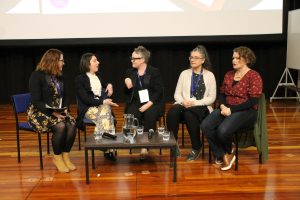
The first evening. Kirby-Jane Hallum, Madeleine Seys, Catherine Smith, Lisa Chatfield and Tina Makereti.
Curiosity in Things Conference
Call for Papers
HELD IN TRUST: CURIOSITY IN THINGS
A conference co-sponsored by Otago Museum and the Centre for Research on Colonial Culture, University of Otago
24-25 January 2019
Barclay Theatre, Otago Museum
The history of museums has largely been framed under the rubric of colonial domination or building cathedrals of science. But what are the bigger stories that motivated the creation of the collections?
Objects have the capacity to tell stories of lives and communities that are interconnected over space and time. Objects are the tangible material world of scientific endeavour and during the nineteenth century trade in them boomed, yet accounts of the political context surrounding their discovery and translocation are overlooked.
Looking beyond object biographies, tales of eccentric collectors, acquisition and institutional histories, this conference foregrounds the global context of commercial trade and exchange networks that contributed to the patterns of knowledge discovery and creation. What then are the bigger stories of culture, economics and politics that formed our colonial museums?
We invite contributions that address the broad theme of knowledge production in the colonial museum.
Keynote speakers:
- Professor Tony Ballantyne FRSNZ Co-director Centre for Research on Colonial Culture and Pro-Vice Chancellor Humanities, University of Otago.
- Professor Simon Ville, Senior Professor of Economic and Business History, School of Humanities and Social Inquiry in the Faculty of Law, Humanities and Arts, University of Woollongong.
- Associate Professor Conal McCarthy, Director of the Museum and Heritage Studies programme at Victoria University of Wellington.
Please send your abstract (max. 250 words) and one-page CV to crocc@otago.ac.nz by September 15th, 2018.
For further information, please contact Rosi Crane (Rosi.Crane@otagomuseum.nz).
Museums, Digital Collections and Indigenous Futures Talks
All are welcome to attend an open seminar on Thursday 22 February featuring two scholars who will speak about their current projects that aim to reconnect indigenous communities with objects and archives, making them available for future use and reinterpretation.
Location: Moot Court, 10th Floor, Richardson Building, starting at 10am
Associate Professor Aaron Glass (Bard Graduate Center, New York) will discuss his involvement in producing a new critical edition of anthropologist Franz Boas’s 1897 landmark book, The Social Organization and Secret Societies of the Kwakiutl Indians, which uses digital media to link museums, archives and communities while recuperating ethnographic records for current and future use. Not only did the volume make draw upon existing museum collections from around the world, Boas and his indigenous collaborator, George Hunt, left a vast archive of unpublished materials relevant to the creation and afterlife of the 1897 text, including hundreds of pages of Hunt’s corrections and amendments. An international and collaborative endeavour to create a new annotated critical edition of the book – both in print and in digital formats – unites published and unpublished materials with current Kwakwaka’wakw knowledge. This presentation discusses that project and presents an interactive prototype for the digital edition that re-embeds ethnographic knowledge within Indigenous epistemological frameworks and hereditary protocols for access.
Associate Professor Conal McCarthy (Victoria University of Wellington) will outline two current trends in museum research in Australia and Aotearoa: one looking back to the history of collections, ethnology and colonisation, and the other looking forward to digital technology, co-curating and an emerging indigenous Museology. It will briefly introduce various projects which aim to reconnect tribal descendants to ancestral heritage through digital tools which enable the reassembly of scattered records, material culture and images. It will introduce the Marsden-funed project ‘Te Ao Hou: Imagining Worlds in New Zealand, 1900-1950’ led by Anne Salmond at Auckland University, which follows Māori leaders Apirana Ngata and Peter Buck through their involvement in the Dominion Museum ethnological expeditions, the Polynesian Society and the Board of Māori Ethnological Research. It considers the mobilising of relational concepts such as whakaapa/kinship, which were applied in Buck and Ngata’s ‘practical anthropology’, and the lessons of their experiments for both Māori museum practice today and contemporary tribal development generally.
Open Seminar: Museums, Digital Collections and Indigenous Futures
On 22 February the Centre is hosting an open seminar featuring two scholars who will speak about their current projects that aim to reconnect indigenous communities with objects and archives, making them available for future use and reinterpretation.
Location: Moot Court, 10th Floor, Richardson Building
All welcome.
Associate Professor Aaron Glass (Bard Graduate Center, New York) will discuss his involvement in producing a new critical edition of anthropologist Franz Boas’s 1897 landmark book, The Social Organization and Secret Societies of the Kwakiutl Indians, which uses digital media to link museums, archives and communities while recuperating ethnographic records for current and future use. Not only did the volume make draw upon existing museum collections from around the world, Boas and his indigenous collaborator, George Hunt, left a vast archive of unpublished materials relevant to the creation and afterlife of the 1897 text, including hundreds of pages of Hunt’s corrections and amendments. An international and collaborative endeavour to create a new annotated critical edition of the book – both in print and in digital formats – unites published and unpublished materials with current Kwakwaka’wakw knowledge. This presentation discusses that project and presents an interactive prototype for the digital edition that re-embeds ethnographic knowledge within Indigenous epistemological frameworks and hereditary protocols for access.
Associate Professor Conal McCarthy (Victoria University of Wellington) will outline two current trends in museum research in Australia and Aotearoa: one looking back to the history of collections, ethnology and colonisation, and the other looking forward to digital technology, co-curating and an emerging indigenous Museology. It will briefly introduce various projects which aim to reconnect tribal descendants to ancestral heritage through digital tools which enable the reassembly of scattered records, material culture and images. It will introduce the Marsden-funed project ‘Te Ao Hou: Imagining Worlds in New Zealand, 1900-1950’ led by Anne Salmond at Auckland University, which follows Māori leaders Apirana Ngata and Peter Buck through their involvement in the Dominion Museum ethnological expeditions, the Polynesian Society and the Board of Māori Ethnological Research. It considers the mobilising of relational concepts such as whakaapa/kinship, which were applied in Buck and Ngata’s ‘practical anthropology’, and the lessons of their experiments for both Māori museum practice today and contemporary tribal development generally.
Aaron Glass is an Associate Professor at Bard Graduate Center in New York City, and a Research Associate in the Division of Anthropology at the American Museum of Natural History. He specializes in First Nations art, material culture, media, and performance on the Northwest Coast of North America, as well as the history of anthropology and museums. His books include The Totem Pole: An Intercultural History (co-authored with Aldona Jonaitis, 2010), Objects of Exchange: Social and Material Transformation on the Late Nineteenth-Century Northwest Coast (the catalogue for an exhibition he curated at Bard Graduate Center in 2011), and Return to the Land of the Head Hunters: Edward S. Curtis, the Kwakwaka’wakw, and the Making of Modern Cinema (co-edited with Brad Evans, 2014).
Conal McCarthy is Director of the Museum & Heritage Studies programme at Victoria University of Wellington. He has published widely on museum history, theory and practice, including the books Exhibiting Māori (2007), Museums and Maori (2011), and Museum Practice (2015). He co-authored Collecting, ordering, governing: Anthropology, museums and government (Duke University Press, 2017), and co-edited a volume of essays in memory of Jonathan Mane-Wheoki (Victoria University Press). In 2018 he will publish the history of Te Papa (Te Papa Press), Curatopia: Museums and the future of research (co-edited with Philipp Schorch, Manchester University Press) and a book ‘Indigenous Museologies’ in Australia and Aotearoa New Zealand (Routledge). Among his current research projects is the history of museum visitation in Australia and New Zealand, and a Marsden funded project led by Professor Anne Salmond ‘Te Ao Hou: Transforming worlds in New Zealand 1900-1950’.
Four Waves of Feminism
If you missed last month’s Making Women Visible conference, or there were papers on the programme you wanted to see, but couldn’t, then you’re in luck! The Dowse in Lower Hutt is hosting a one-day symposium, Four Waves of Feminism, on 8 April that brings together presenters from the conference, and others, to discuss feminism in contemporary art, art history and curating. This is going to be a popular event, so make sure you register your interest in attending ASAP!
Annual Local History Lecture
Seán Brosnahan, curator at Toitū Otago Settlers Museum, will be speaking about ‘Becoming Toitū: telling the Otago story in a museum setting’. His lecture takes place today, 10 April, at 5:30pm in Moot Court, Richardson Building, University of Otago. All welcome!
Hawkes Bay Museum and Art Gallery
Are you fascinated by museums and material culture? Are you interested in following the exciting developments taking place at the Hawkes Bay Museum and Art Gallery? If so, we encourage you to follow the HBMAG Blog, which features articles about some of the amazing treasures held by the institution, as well as updates on the changes taking place at the museum.
Colonial Objects Conference
Registration for the Colonial Objects Conference (11-13 February 2013) is now open. To start the process click here.

